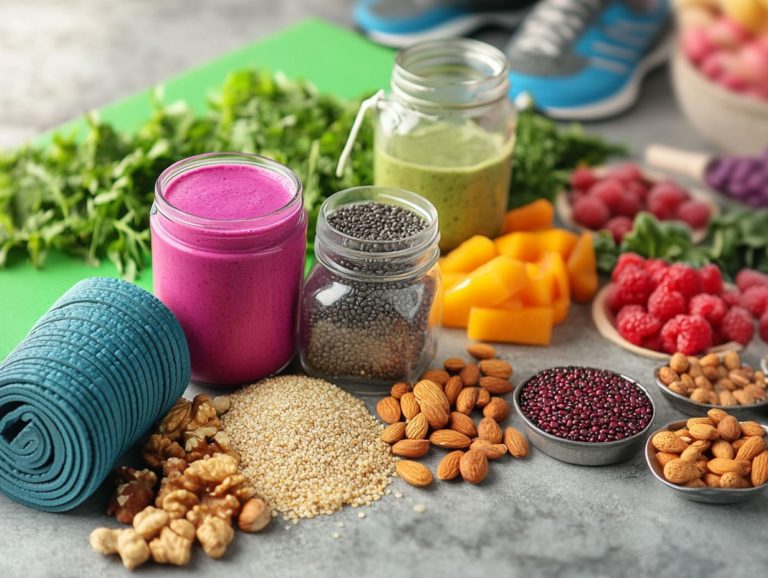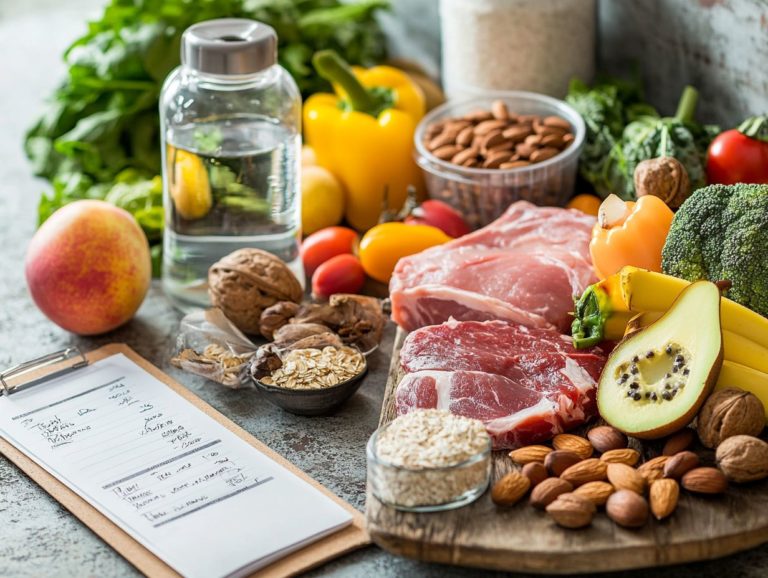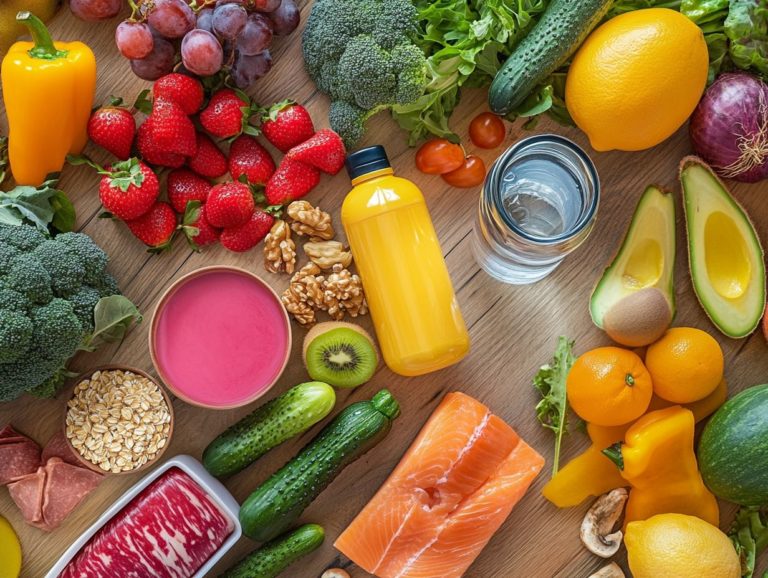Nutrition for Plant-Based Families: Tips and Tricks
Plant-based nutrition transcends mere dietary choice; it s a vibrant lifestyle brimming with remarkable benefits for families of every shape and size.
This article delves into the essentials of plant-based eating, showcasing its health advantages for everyone from toddlers to seniors. Whether you’re contemplating a full transition or simply eager to weave more plant-based meals into your daily routine, you’ll find practical insights on meal planning, grocery shopping, and navigating social scenarios.
Embark on this journey to uncover how to make plant-based living not only nutritious but also enjoyable for your entire family!
Contents
- Key Takeaways:
- What is Plant-Based Nutrition?
- Benefits of a Plant-Based Diet for Families
- Getting Started with Plant-Based Nutrition
- Tips for Meal Planning and Grocery Shopping
- Navigating Social Situations and Family Dynamics
- Frequently Asked Questions
- What does a plant-based diet consist of?
- Is it possible to get all necessary nutrients on a plant-based diet?
- How can I ensure my child gets enough protein on a plant-based diet?
- What are some tips for picky eaters in a plant-based family?
- How can I make sure my child is getting enough calcium without dairy products?
- Are there any potential health risks of a plant-based diet for children?
Key Takeaways:

- Incorporate a variety of plant-based foods to ensure essential nutrients are met.
- Get creative with meal planning and involve children in the process for a fun and healthy experience.
- Communicate openly with family members and educate others on the benefits of a plant-based diet to navigate social situations and potential resistance.
What is Plant-Based Nutrition?
Plant-based nutrition is a dietary philosophy that highlights the importance of embracing whole, unprocessed foods sourced from plants think vibrant fruits, crisp vegetables, hearty grains, and nutrient-rich nuts and seeds while minimizing or altogether avoiding animal products.
This choice helps your health and well-being and plays a pivotal role in promoting environmental sustainability by reducing gases that harm our environment tied to animal agriculture.
By making informed food choices, you can cultivate a healthier future for both yourself and the planet. You ll also instill positive habits in the generations to come.
Understanding the Basics
Understanding the fundamentals of plant-based nutrition means recognizing the value of whole foods and seasonal vegetables, as well as the myriad health benefits that come from incorporating a diverse array of plant-derived ingredients into your meals.
This approach nurtures your well-being and aligns with sustainable living by reducing your environmental footprint. At its essence, plant-based nutrition champions foods that are minimally processed, nutrient-dense, and bursting with flavor.
By diving into grains, nuts, seeds, legumes, fruits, and vegetables, you can reap the benefits of essential vitamins and minerals while lowering your risk of chronic diseases.
Educating yourself on these principles cultivates a heightened awareness of your food choices, enabling you to establish healthier habits that resonate with your lifestyle. Engaging with community programs and resources can further amplify your understanding of the importance of these dietary changes, contributing to a broader enhancement of public health.
Benefits of a Plant-Based Diet for Families
Adopting a plant-based diet presents a wealth of advantages for families. It enhances health outcomes and nurtures a sense of community and compassion for animal welfare.
Prioritizing plant-based meals helps in lowering chronic disease risks and makes healthy eating a fun family affair! You create a supportive environment for healthy eating habits.
Health Benefits for All Ages
The health benefits of a plant-based diet are not just a trend; they re backed by solid research and can positively impact individuals of all ages, from young children to beloved grandparents. This promotes overall wellness and helps prevent chronic health issues.
Studies show kids who eat lots of fruits, vegetables, whole grains, and legumes meet their nutritional needs. They also get smarter and more energetic!
For adults, the advantages are compelling. This diet is linked to a lower risk of heart disease and diabetes, thanks to the nutrient-rich fiber and antioxidants that support a robust immune system.
For older adults, the rewards are significant, including better bone health and reduced inflammation from nutrient-dense foods rich in calcium and magnesium. By adopting a family-centered approach to nutrition, you can make healthy eating a delightful and sustainable practice that benefits everyone across generations.
Getting Started with Plant-Based Nutrition

Starting out with plant-based nutrition requires a careful transition that considers your dietary preferences, cooking skills, and meal planning. To support this shift, refer to vegan nutrition: key tips for plant-based diets, which ensures a balanced and enjoyable eating experience for everyone in the family.
Transitioning to a Plant-Based Diet
Transitioning to a plant-based diet can be a rewarding journey. However, it may come with challenges that require thoughtful strategies and support from family and community.
You might encounter some resistance from family members who are unsure about this dietary shift. The thought of creating flavorful, nutritious plant-based meals can feel daunting when you re just starting out.
Why not involve your loved ones in the fun of cooking together? Sharing information and inviting them to experiment with new recipes can make a big difference. Exploring local resources or online communities can also provide valuable support.
By fostering open dialogue and showcasing the benefits, you can navigate this lifestyle change with greater ease and enjoyment.
Essential Nutrients to Consider
When you adopt a plant-based diet, it s essential to pay attention to key nutrients like protein, iron, calcium, and vitamin B12 to maintain your health and wellness.
- Protein: lentils, quinoa, chickpeas
- Iron: leafy greens, nuts, seeds
- Calcium: fortified plant-based milks, tofu
- Vitamin B12: fortified foods, supplements
These nutrients are fundamental for your body’s functions. For example, protein is crucial for muscle repair and growth, while iron is vital for transporting oxygen in your blood. You ll be thrilled to discover how easy it is to meet your protein needs with delicious foods!
Staying informed about these nutrients can dramatically enhance your nutritional intake and promote vibrant health.
Tips for Meal Planning and Grocery Shopping
Effective meal planning and grocery shopping are essential skills for families embracing a plant-based diet. Mastering these practices simplifies the process of preparing budget-friendly meals that are nutritious, satisfying, and enjoyable for every family member.
Budget-Friendly Options
Finding budget-friendly options for a plant-based diet is not just possible; it s a gratifying experience! You can explore an array of affordable ingredients and delightful recipes tailored to your preferences.
By focusing on seasonal produce, you can enjoy fresh fruits and vegetables at reduced prices. For instance, choosing sweet potatoes in the fall and zucchini in the summer not only elevates your dishes but also keeps your expenses in check.
Incorporating cost-effective staples like lentils, beans, and rice into your weekly recipes ensures you re nourishing both your body and your budget. Embracing smart shopping strategies such as buying in bulk and frequenting local farmers’ markets can stretch your grocery budget further and spark your creativity in crafting wholesome plant-based dishes.
Kid-Friendly Recipes and Snacks

Creating kid-friendly plant-based recipes and snacks can truly transform how children perceive healthy eating, offering nutritious options that appeal to their tastes.
By incorporating vibrant fruits, wholesome grains, and an array of colorful vegetables, you can introduce exciting flavors and textures that captivate young palates. Imagine tasty smoothies made from bananas and spinach or delightful, bite-sized veggie sticks served alongside hummus these are just a couple of examples that turn healthy eating into a fun experience.
Consider recipes like whole-grain pancakes topped with luscious berries or nut butter; they make for scrumptious breakfast alternatives, ensuring each meal is both satisfying and nourishing. When making these choices, it s crucial to prioritize ingredients rich in essential vitamins and minerals, laying the groundwork for lifelong healthy habits.
Navigating social situations and family dynamics while maintaining a plant-based diet can be tough, but it’s a fun opportunity! It also opens the door to meaningful conversations and fosters greater awareness about health and animal welfare, enriching both your experience and those around you.
Dealing with Criticism and Resistance
Dealing with criticism and resistance from family or friends is something you may encounter while transitioning to a plant-based diet, but embracing open communication and empathy can serve as a bridge over those gaps.
As you navigate these conversations, it s vital to approach discussions with a mindset rooted in understanding and respect. When someone raises an eyebrow at your dietary choices, seize it as a chance to share your personal motivations and the benefits you’ve experienced from this new lifestyle. Not only does this create a space for positive dialogue, but it also encourages your loved ones to express their feelings without feeling defensive.
By actively listening to their concerns and responding with genuine compassion, you can cultivate an atmosphere of collaboration, where everyone feels heard. This approach could lead to greater acceptance and mutual support on your dietary journey.
Involving Children in the Process
Involving children in the journey of adopting a plant-based diet not only enhances their cooking skills but also nurtures a sense of ownership and excitement about healthy eating. By encouraging them to participate in meal planning and recipe selection, you allow them to express their preferences, creating a more engaging experience.
Letting them choose vibrant vegetables or fruits they d like to try can ignite their interest in the kitchen, transforming what might seem like a chore into a delightful activity. When you allow them to assist with meal prep whether it s washing produce or stirring pots you help them feel confident and independent.
This shared experience not only imparts valuable culinary skills but also enriches their understanding of nutrition, reinforcing the essential connection between food, health, and sustainability.
Frequently Asked Questions
Here are some common questions about plant-based diets:
What does a plant-based diet consist of?

A plant-based diet focuses on eating whole foods from plants, such as fruits, vegetables, whole grains, legumes, nuts, and seeds. It excludes animal products like meat, dairy, and eggs.
Is it possible to get all necessary nutrients on a plant-based diet?
Yes, it is definitely possible to get all the necessary nutrients on a plant-based diet. By consuming a variety of fruits, vegetables, legumes, and whole grains, plant-based families can meet their daily requirements for protein, iron, calcium, and other essential vitamins and minerals.
How can I ensure my child gets enough protein on a plant-based diet?
There are many plant-based sources of protein that can provide the daily requirement for children. Some examples include tofu, tempeh, lentils, beans, quinoa, and nuts. Incorporating a variety of these foods into meals and snacks can help ensure adequate protein intake.
Don’t wait to start making these delicious meals!
What are some tips for picky eaters in a plant-based family?
Introducing new foods to picky eaters can be challenging, but it can also be fun! Involve them in meal planning and preparation to spark their excitement about trying new foods.
Offer a variety of flavors and textures. Be patient, as it may take multiple attempts before a child accepts a new food.
How can I make sure my child is getting enough calcium without dairy products?
Dairy is not the only source of calcium. Leafy greens, tofu, almonds, sesame seeds, and fortified plant-based milk are great alternatives.
Incorporate these foods into your child s meals and snacks to help them meet their daily calcium needs. Fortified means that nutrients have been added to a food to enhance its nutritional value.
Are there any potential health risks of a plant-based diet for children?
A well-planned and balanced plant-based diet poses no significant health risks for children. Consult a healthcare professional to ensure your child is getting enough nutrients.






